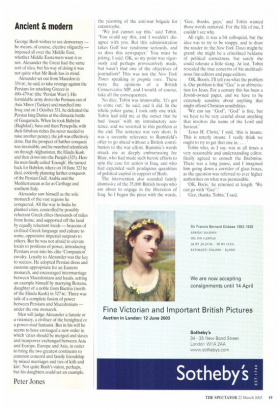Ancient & modern
George Bush wishes to see democracy — he means, of course, elective oligarchy — imposed all over the Middle East, whether Middle Easterners want it or not. Alexander the Great had the same sort of idea, but his way of doing it was not quite what Mr Bush has in mind.
Alexander set out from Macedon in 334 nc, he said, to take revenge against the Persians for attacking Greece in 490-479 BC (the 'Persian Wars'). His formidable army drove the Persians out of Asia Minor (Turkey) and marched into Iraq; and on 1 October 331, he defeated the Persian king Darius at the climactic battle of Gaugamela. When he took Babylon (Baghdad), Susa and then Persepolis, with their fabulous riches (he never needed to raise another penny), the job was effectively done. But the prospect of further conquest was irresistible, and he marched relentlessly on through Afghanistan, the Hindu Kush and then down into the Punjab (325). Here his men finally called 'Enough'. He turned back for Babylon, where on 10 June 323 he died, evidently planning further conquests of the Persian Gulf. Arabia and the Mediterranean as far as Carthage and southern Italy.
Alexander saw himself as the sole monarch of the vast regions he conquered. All the way to India he planted cities, controlled by possibly reluctant Greek elites thousands of miles from home, and supported off the land by equally reluctant locals — beacons of civilised Greek language and culture to some, oppressive imperial outposts to others. But he was not afraid to elevate locals to positions of power, introducing Persians even into his elite `Companion' cavalry. Loyalty to Alexander was the key to success. He adopted Persian dress and customs appropriate for an Eastern monarch, and encouraged intermarriage between Macedonians and locals, setting an example himself by marrying Roxana, daughter of a noble from Bactria (north of the Hindu Kush) in 327 BC. There was talk of a complete fusion of power between Persians and Macedonians — under the one monarch.
Men will judge Alexander a fanatic or a visionary, a civiliser of the benighted or a power-mad fantasist. But in his will he seems to have envisaged a new order in which 'cities should be merged and slaves and manpower exchanged between Asia and Europe, Europe and Asia, in order to bring the two greatest continents to common concord and family friendship by mixed marriages and ties of kith and kin'. Not quite Bush's vision, perhaps, but his daughters could set an example.




































































 Previous page
Previous page